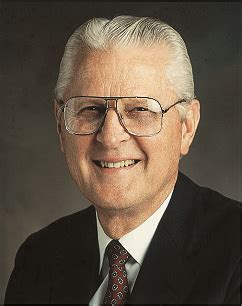A Quote by Wallace D. Wattles
To exercise some sort of control over others is the secret motive of every selfish person.
Related Quotes
I talk to groups studying the most advanced spiritual teachings and sometimes these people wonder why nothing is happening in their lives. Their motive is the attainment of inner peace for themselves - which of course is a selfish motive. You will not find it with this motive. The motive, if you are to find inner peace, must be an outgoing motive. Service, of course, service. Giving, not getting. Your motive must be good if your work is to have good effect. The secret of life is being of service.
The dictionary describes a selfish person as one who is 'concerned excessively or exclusively with oneself: seeking pleasure or well-being without regard for others.' May we add, a selfish person is often one who refers to 'I,' 'me,' and 'mine' rather than to 'we,' 'ours,' 'yours,' or 'theirs.' This person is anxious to be in the limelight, to be on center stage in life's little dramas. He or she may be a poor listener, or a conversation monopolizer. Selfishness is the great unknown sin. No selfish person ever thought himself to be selfish.
Years of research show us that the less control a person feels over an aversive stimuli coming at them, the more likely they are to disengage. Complete loss of control over a sustained period of time can actually lead to depression. It then follows that giving the person a level of control over the situation reduce the stress - and perhaps restore the disengagement.
Every person has the power to make others happy. Some do it simply by entering a room others by leaving the room. Some individuals leave trails of gloom; others, trails of joy. Some leave trails of hate and bitterness; others, trails of love and harmony. Some leave trails of cynicism and pessimism; others trails of faith and optimism. Some leave trails of criticism and resignation; others trails of gratitude and hope. What kind of trails do you leave?
A wonderful fact to reflect upon, that every human creature is constituted to be that profound secret and mystery to every other. A solemn consideration, when I enter a great city by night, that every one of those darkly clustered houses encloses its own secret; that every room in every one of them encloses its own secret; that every beating heart in the hundreds of thousands of breasts there, is, in some of its imaginings, a secret to the heart nearest it!



































